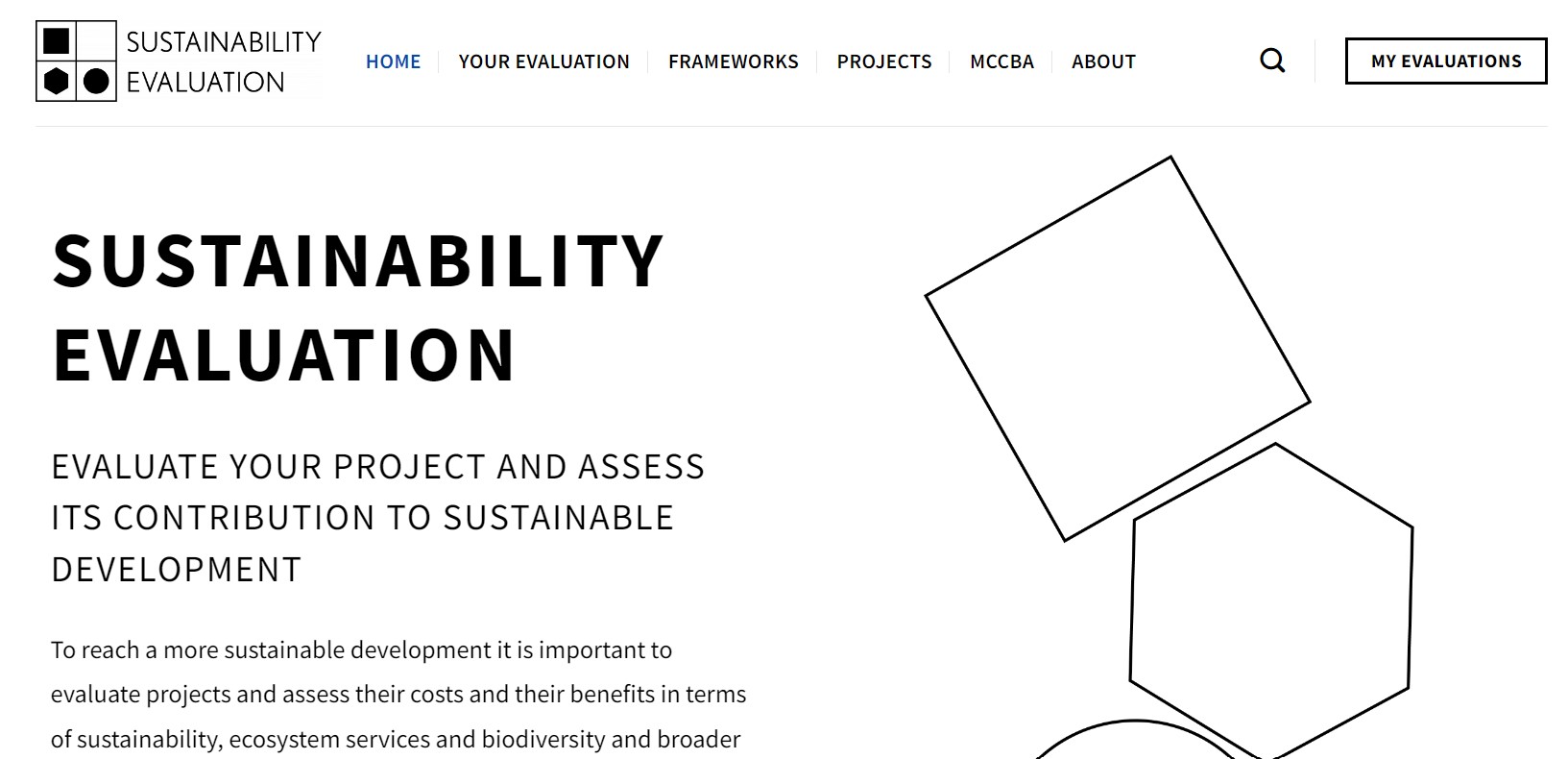
Stakeholder meeting in Friesland
The RSG Meeting in the Netherlands on 14 April 2023
Delta Lady project came to an end on 31st of May 2023!
The final conference was held on 26-27 January 2023 in the city of Leeuwarden in Friesland, in the Netherlands.
The project focused on river deltas in Europe and their potential to develop innovative activities aiming at utilization of local natural and cultural heritage. The aim was to improve the regional policy instruments that foster the capabilities of using ecosystem services in river deltas to strengthen regional economy. The delta regions are rich in biodiversity but poor financially. The challenge was how to foster the natural and cultural capabilities available from the past and to develop new experiences based on ecoservices in river deltas to boost regional economy. 6 delta regions participate: Rijn delta (NL), Danube delta (RO), Camargue delta (FR), Albufera delta (ES), Po delta (IT) and River Blackwater delta (IE). 9 partners from 6 countries represent a mix of regional and local public authorities as well as education and research institutes. 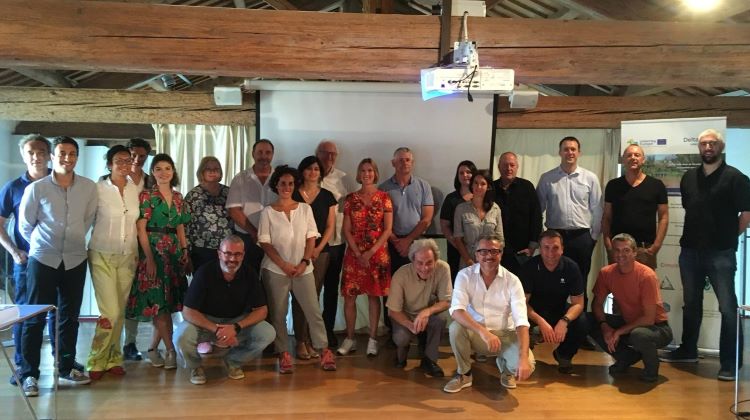
After 5 years of working together, partners found high opportunities in cross-regional learning and cooperation in fostering the capabilities of using local natural and cultural qualities of delta regions. Partners have engaged well with each other and each partner developed a better understanding of the capacity and expertise of other partners. The policy learning process started at the 1st Interregional Learning Event in France. Partners shared some experiences on a few joint themes such as nitrification of water, design based on local resources, payments for ecosystem services, and tools for the development of regional capabilities. An overarching strategy is to put ecosystem services on the agenda of the EU Regional Development with illustrative operational instruments for deltas. The 2nd Interregional Learning Event in Spain was dedicated to learning the best practices and focusing on innovative ecosystem services in deltas. Stakeholder involvement was ensured through the RSG meetings where local actors had opportunities to describe their challenges and expectations which is the added value of the project. The 3rd Interregional Learning Event in Italy was dedicated to the exchange of experiences on the use of Payments for Ecosystem Services (PES) schemes in the participating delta regions. The 4th Interregional Learning Event and Partner Meeting was held online, as the Covid-19 outbreak prevented the planned meeting in Cork, Ireland. The meeting was dedicated to the development of action plans for delta regions. The two-day online meeting was successfully concluded by identifying further steps and activities for the continuation of the project. The 5th Interregional Learning Event to be held in Tulcea, Romania, was instead organized online as well, due to the Covid-19 situation. The focus of the meeting was on action plans and sustainable business models. The 6th Interregional Learning Event was planned to be organized in the Province of Friesland but instead was held online on 14-15 September 2021. The focus of the meeting was on the progress related to action plans and the lessons learned from the exchange of experiences process in Phase 1. The Final Conference of the project was organized was organized in Friesland, in Leeuwarden, on 26-27 January 2023.
€1,745,494.00
Environment and resource efficiency
The project encouraged all relevant stakeholders to get actively involved in the process which resulted in the improved implementation of the regional policy instruments leading to better use of deltas' ecosystem services for regional economy. This was done through policy improvements, improvement of governance, interregional learning sessions, development of action plans, identification of good practices and sharing and active work in chosen deltas with involvement of regional stakeholder groups.
Northern Innovation Agenda concerns a joint course towards economic growth, employment and well-being in the Northern Netherlands, addressing current social challenges around water, renewable sources, food, health as starting point and building on the existing qualities and knowledge for realization of innovative solutions for regional economic development.
The agenda is developed along three lines of investment. One of the investment lines is renewing ecosystems which entail an environment where new ecosystem products and services are developed in a good interaction with a society.
The reason for improving this policy instrument is that Innovation Agenda does not have a specific focus on the ecosystem services of deltas and their potential is not used for implementing this strategy. Therefore, we want to introduce new, innovative aspect in the policy instrument that would foster diverse economic development for the addressed region.
The charter, established for 2011-2026, has 4 major ambitions:
1. To manage the delta complex by integrating the impacts of the climate change;
2. To guide the evolution of the activities to the benefit of an exceptional biodiversity;
3. To strengthen the territorial solidarity, social cohesion and improve the living environment;
4. To share the knowledge and open the delta to the Mediterranean cooperation.
For this purpose, the Park must be a tool to renew its actions, initiate new partnerships to take up the challenges facing the territory.
The reason for improving this instrument is that there is currently no commitment regarding the use of ecosystem services in deltas. These improvements are necessary for the territory, also classified as a Biosphere Reserve by UNESCO (RNPC being co-manager), in order to better meet the objectives of its program.
ROP aims at promoting smart sustainable and inclusive growth to make regions more attractive. It addresses major development challenges for Romania: regional competitiveness, sustainable urban development, low-carbon economy and economic and social infrastructure at regional and local levels.
Actions aim at addressing TO 6 'Environment and resource efficiency' through the axis/ measures of separate financial allocation for Danube Delta (DD), through the Integrated Territorial Investments Instrument in accordance with the DD Integrated Development Strategy (DDIDS).
In a regional context with multiple protection statuses (UNESCO Ramsar and Natura 2000), innovative approaches for sustainable economic development through valorization and efficient management of natural and cultural resources are needed. Although ROP provides funding for improving urban environment and preserving and valorizing cultural heritage, there is no specific reference to the use of ecosystem services for achieving the programme’s objectives and the ways to promote different uses of ecosystem services that could contribute to regional economy. The actions of ROP focused on DD have potential for improvement taking into account specific aspects of delta ecosystems and needs of local communities, with the help of lessons learnt through exchange of experiences with similar areas in Europe.
Po Delta Park Territorial Plan is dedicated to the development of Po Delta area. Objectives relevant to the project are:
-Protection and valorization of natural/cultural heritage, environment and landscape in the park area;
-Management and safeguarding of wetlands;
-Protection and valorization of water, forest and habitats;
-Management of agriculture, fishery and hunting activities.
All these topics identify ecosystem services as a resource. Moreover, Territorial Plan is related to the Po Delta Park Strategic Plan, that is aimed at conservation and valorization of biodiversity through different measures, such as:
-Supporting agriculture, tourism and aquaculture operators;
-Raising awareness of interested parties about delta's natural and cultural capital value.
The reason for improvement of this policy instrument is that it has measures related to ecosystem services, but lacks financial operative tools and competences among local actors. With the project we want to develop mechanisms of Payments for Ecosystem Services (PES) and promote shared solutions and Public Private Partnership (PPP).
PPP and PES can integrate Po Delta Park Territorial Plan measures and increase its effects on local development and ecosystem services restoration. The ecosystem services valorization is particularly strategic for Po Delta Park that obtained the Man And Biosphere “MAB” UNESCO acknowledgement in 2015.
This Operational Programme (OP) addresses thematic Objective 6: Preserving and protecting the environment and promoting resource efficiency.
Priority Investment 6c: Conservation, protection and development of natural and cultural heritage.
Specific Objective 6.3.2: Protection, development and promotion of natural areas, in particular of touristic interest.
This OP aims at accomplishing the Territorial Strategy of the Valencia Region for 2030 (ETCV 2030), in particular by:
- Promoting efficient use of resources;
- Green infrastructures;
- Valorization of landscape;
- Connecting landscapes with relevant nature areas to facilitate the attraction of visitors;
- Recovery of the natural and landscape heritage linked to historic, livestock and green-ways;
- Developing healthy leisure and touristic activities that have an economic repercussion in the development of the region.
The policy instrument needs to be improved because Valencia region has very high valuable natural resources with around 45% of its territory declared as “protected area” according to the environmental regulation at regional, national and EU levels. Its “green infrastructure” (all areas and elements with natural, cultural and visual value), constitutes a big asset for the attractiveness and efficiency of the territory, which makes it necessary to preserve and improve it to guarantee economic growth and quality of life.
Prior to the establishment of the three new Regional Assemblies on January 1st, 2015, the eight previous Regional Authorities produced individual Regional Planning Guidelines (RPGs), which remained in force until 2017. The implementation of RPGs plays an important role in the national economic recovery.
Due to changes to Irish Regional structure, RPGs will be reviewed and will be replaced by Regional Spatial & Economic Strategy (RSES) for each region.
The "objective of RSES shall be to support implementation of National Spatial Strategy and economic policies and objectives of the Government by providing a long-term strategic planning and economic framework for the development of the region for which the strategies are prepared which shall be consistent with National Spatial Strategy and economic policies or objectives of the Government” (Section 23 of the Planning and Development Act 2000).
Due to impending preparation of RSES, this is an opportune time to incorporate new policy areas such as ecosystem services in deltas. The concept of ecosystem services is not currently mainstreamed into Irish spatial policy. However its inclusion in RSES for Southern Region will, for the 1st time, ensure that there is a policy framework for ecosystem services at regional level. Legally all plans at Local Authorities level must be consistent with RSES, therefore this will ensure that ecosystem services are also incorporated into Local Authority policy documents i.e. Development Plans.

The RSG Meeting in the Netherlands on 14 April 2023
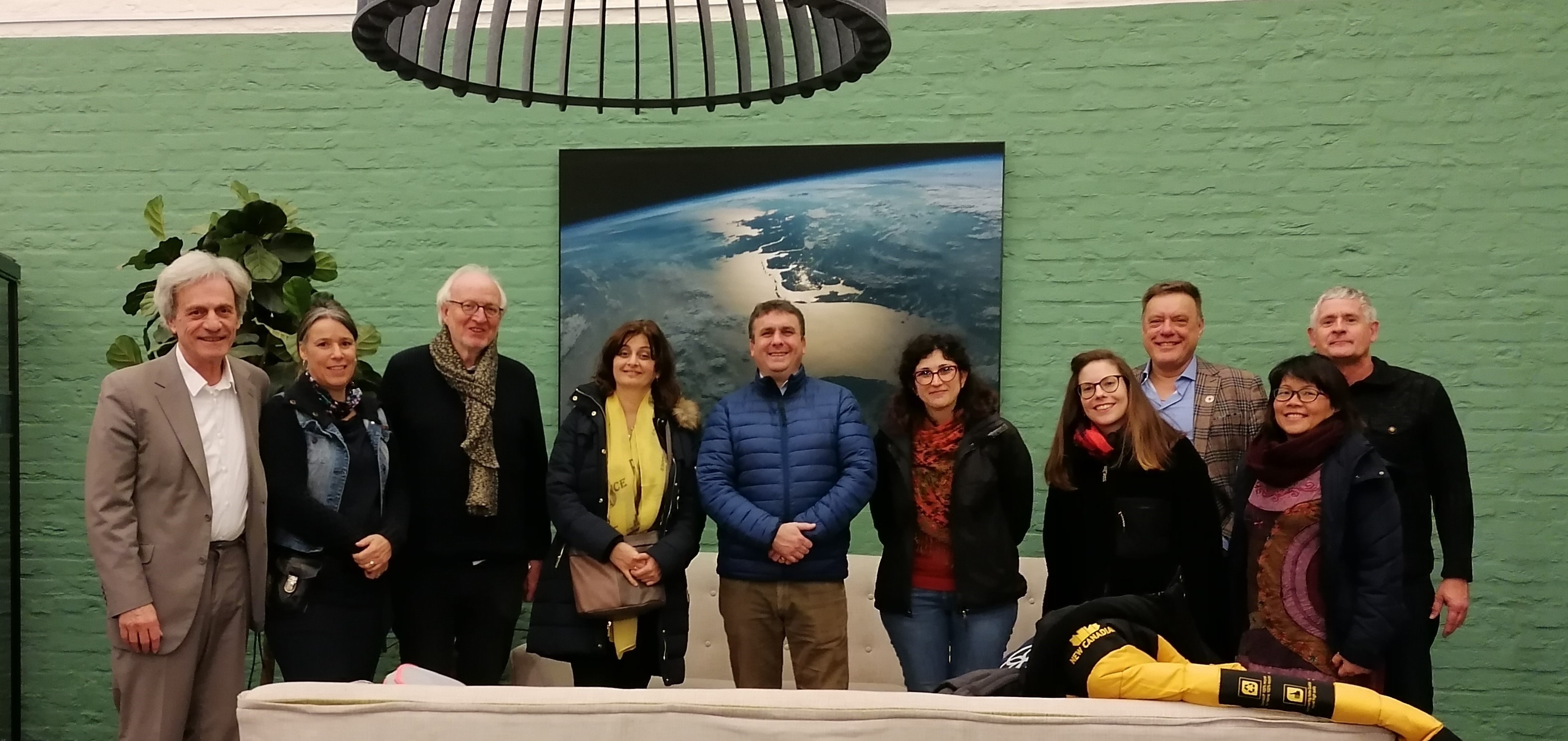
Delta Lady Final Conference on 26-27 Jan 2023
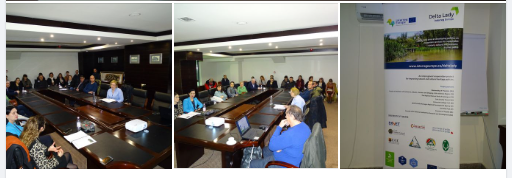
The RSG meeting in Romania on 18 January 2023
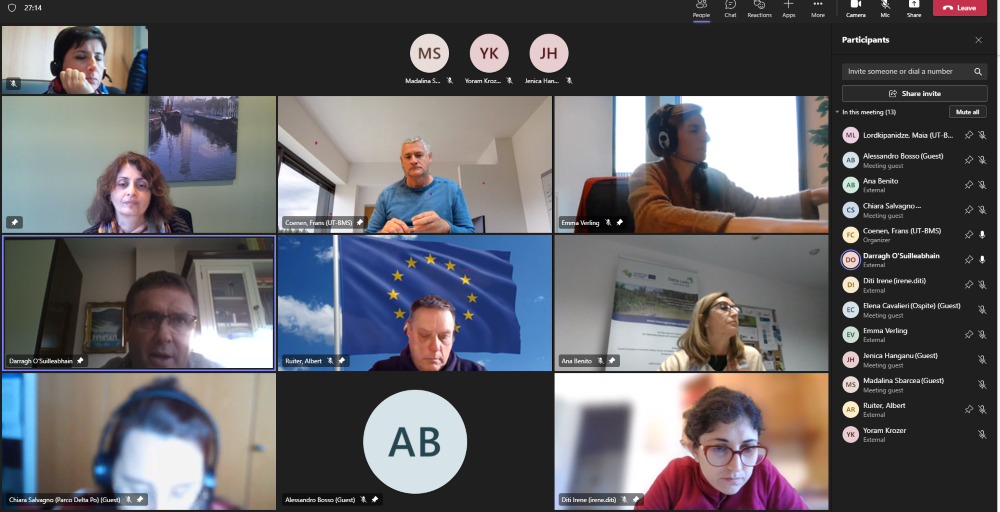
Partners' progress meeting on 28 November 2022
Meeting with Po Delta Tourism on 31 May 2022
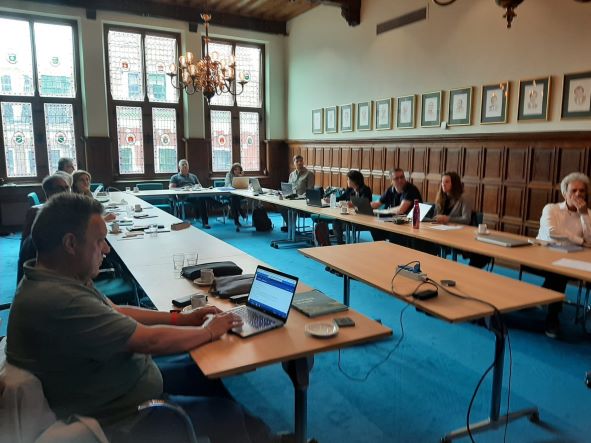
Phase 2 Partner Meeting in the Netherlands
Online stakeholder meeting on 7 April 2022
Meeting with Stakeholders on 6 April 2022

Stakeholder meeting on 29 March 2022 to discuss the roadmap for the implementation of the Action Plan
Stakeholder meeting on 18 March 2021